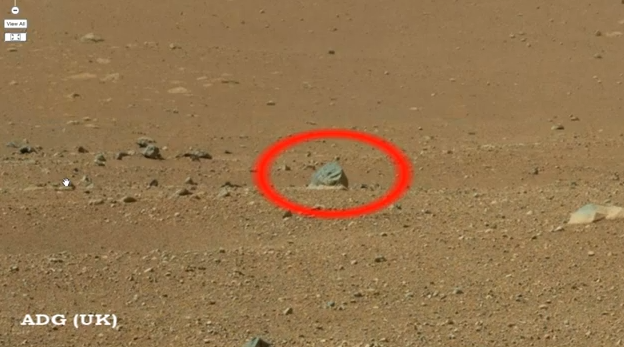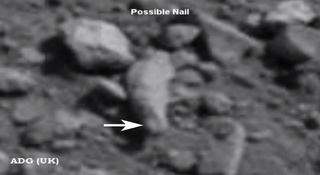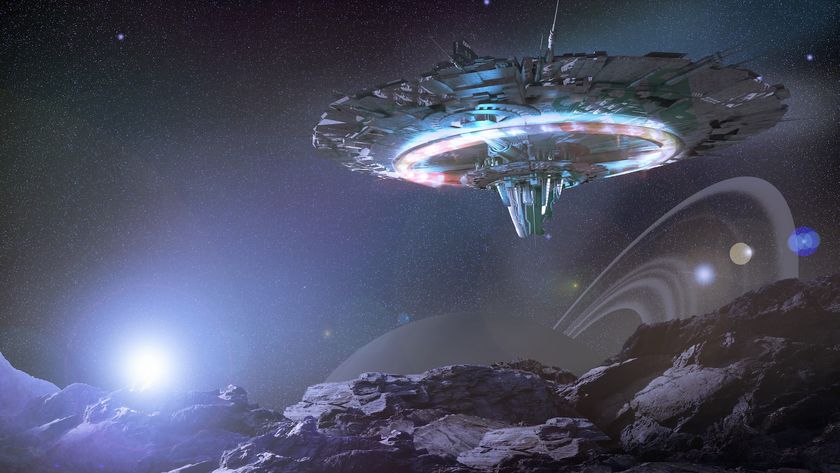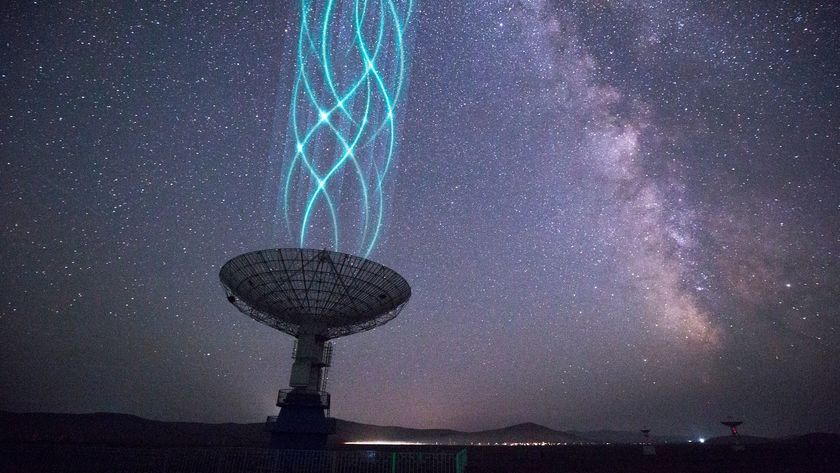Mars Photos by Curiosity Rover Teeming with 'UFOs'

According to the fringe sector of the Internet, Mars is practically teeming with aliens.
Since NASA's Curiosity rover touched down on the Red Planet two weeks ago and powered up its cameras, it has already managed to photograph several alleged UFOs and other "anomalies" in the surrounding landscape.
From classic flying saucers to an absurdly out-of-place fossilized human finger, here's a rundown of what UFO believers claim to have found in Curiosity photos so far. [Gallery of Mars 'UFO' Photos]
Horizon anomaly (aka impact cloud)
Speculation about Martians in Curiosity's midst got off to a running start when the very first sequence of photos taken by the rover raised questions. A hazy, distant object mysteriously appeared and then disappeared in consecutive images of the Martian horizon, perplexing even NASA scientists at first.
But the much-discussed "anomaly" turned out not to be a sign of alien activity, but rather the plume of dust kicked up by the sky crane that delivered the rover close to the Martian surface, then veered off and struck the ground some 2,000 feet (600 meters) away.
"We believe we've caught what is the descent stage impact on the Martian surface," said NASA engineer Steven Sell, sky crane specialist on the Curiosity mission.
Sign up for the Live Science daily newsletter now
Get the world’s most fascinating discoveries delivered straight to your inbox.
Flying saucers (aka dead pixels)
In footage posted to YouTube Aug. 18, user "StephenHannardADGUK" applies a series of filters to a Curiosity image of the nearby rim of Gale crater, revealing what he says are four flying saucer-like objects stationed in the sky. More than 700,000 people have since given the video a gander.
"Four objects caught by Mars Curiosity, very difficult to make out on original image so I have used a few filters to highlight," he said in the video description. "What are these four objects? UFOs, Dust particles, or something else? As always you decide."
Experts say the four "objects" are actually just dead pixels in the rover's CCD camera — single points in the camera's imager that have lost functionality and register as white. Marc D'Antonio, a photo and video analyst for MUFON [Mutual UFO Network], told Huffington Post, "I fully concur at this point that these are dead pixels on the imager. All CCD [cameras] have them, and in a bland atmosphere like that at Mars, they would be very obvious as opposed to an active atmosphere like Earth, where they could end up hidden for a long time before anyone noticed them."
Photoshop filtering processes often blend, color-correct or contrast-heighten images in ways that turn single dead pixels into larger, more prominent shapes. In other words, "using a few filters" is exactly what the YouTube user should not have done in trying to clarify the contents of the Curiosity photo.
White dot UFOs (aka Photoshopped)
In a YouTube video that has racked up more than 400,000 views since it was posted by "ParanormalCollection" on Aug. 7, two small white dots trek across the Martian sky in a time-lapse sequence supposedly shot by one of Curiosity's hazard avoidance cameras and then accidentally "leaked" by NASA. The footage would be very curious indeed, and deserving of the widespread media attention it has accrued — if it were real, that is.
The images that appear in the footage are in fact the very first ones released by NASA, on Aug. 5, in which the impact cloud from the sky crane can be seen rising like a plume near the horizon. The difference is that no white dots appear in the original images.
This leaves viewers to contemplate which is more likely: that Curiosity happened to capture UFOs in the very first photos it took of Mars, that NASA removed the UFOs and released the scrubbed photos, then accidentally leaked the originals to "ParanormalCollection" — or that this YouTube user simply took the photos released by NASA, added a sequence of white dots to them in Photoshop, and posted the creation to YouTube? [7 Huge Misconceptions about Aliens]
Ancient finger, shoe, animal (aka rocks)

StephenHannardADGUK, he of dead pixel fame, also stumbled upon a few items that may or may not be leftover props from a David Lynch film miraculously transported to the floor of Mars' Gale Crater. "Mars Curiosty[sp] captures a possible ancient finger, a dome shaped object, a shoe or sandal and a possible Martian creature," Hannard wrote in the video description. "Are these anomalies real, tricks of the light or something else, as always you decide."
When Hannard zooms in on the rocks — which is what we have decided they are — one sees that the finger rock does indeed have a faint, shadowy outline at one end that looks somewhat like a fingernail, and the shoe rock does bear a resemblance to a carelessly overturned sandal. Likewise, a roughly round rock could be described as a dome-shaped object, and a crevice on another boulder does give it the vague look of a grinning Martian animal.
It's the logical leap of deciding that the rocks might actually be these things that most people don't take.
Follow Natalie Wolchover on Twitter @nattyover or Life's Little Mysteries @llmysteries. We're also on Facebook & Google+.
Natalie Wolchover was a staff writer for Live Science from 2010 to 2012 and is currently a senior physics writer and editor for Quanta Magazine. She holds a bachelor's degree in physics from Tufts University and has studied physics at the University of California, Berkeley. Along with the staff of Quanta, Wolchover won the 2022 Pulitzer Prize for explanatory writing for her work on the building of the James Webb Space Telescope. Her work has also appeared in the The Best American Science and Nature Writing and The Best Writing on Mathematics, Nature, The New Yorker and Popular Science. She was the 2016 winner of the Evert Clark/Seth Payne Award, an annual prize for young science journalists, as well as the winner of the 2017 Science Communication Award for the American Institute of Physics.












